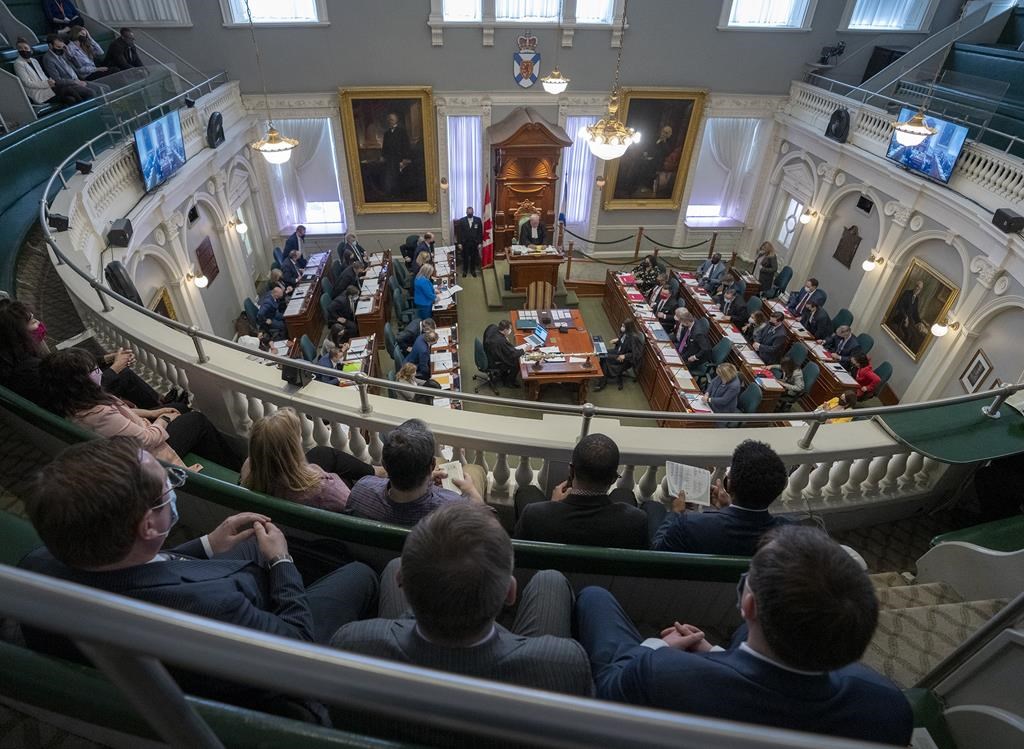The Nova Scotia legislature wrapped up a spring sitting Friday that saw the Progressive Conservative government present a budget and pass just two bills.

Since the sitting began on Feb. 27, the government passed legislation that revamped the operation of the province’s electrical grid, along with an omnibus-style bill that enacts measures in the budget and amends 15 provincial laws.
However, in the face of mounting public opposition, the Tories also shelved a bill that would have led to the consolidation of the Town of Antigonish and Antigonish County.
“You have to have the courage as a government to recognize there’s a different way or when there’s a better way to do something,” Premier Tim Houston told reporters Friday. “We just listen to Nova Scotians.”
The government abruptly backed away from the municipal consolidation bill on Thursday, two days after Houston and Health Minister Michelle Thompson faced loud opposition during a public meeting in Antigonish County. Earlier this year, both municipal councils had voted to proceed with consolidation.
“It became clear from speaking to people that there was a very broad sense in the community that they didn’t have enough information,” said Houston.
The government also “paused” contentious plans for a subsidy for wine bottlers, which the province’s wineries said undercut their operations. Houston made the announcement before a large group of wine growers in the foyer of the legislature after a nearly two-hour meeting with industry representatives the day before and after days of grilling by the opposition in the house of assembly.
- Poilievre booted from House of Commons after calling Trudeau a ‘wacko’
- Federal cabinet minister Randy Boissonnault linked to PPE company embroiled in lawsuits
- Ottawa to propose new asylum rules to allow for faster deportations
- Capital gains tax changes aren’t in the budget bill — but still coming: Freeland
Zach Churchill, the Opposition Liberal Leader, said he was unimpressed with the government’s performance during the sitting, saying it did little but perform a “series of flip-flops.”
“This is not a government that does their homework … and as soon as they take a bit of political heat, because they didn’t do the work in advance, they turtle. They get scared and they reverse course,” said Churchill. “I really think it’s a problematic way to govern.”
NDP Leader Claudia Chender was also critical, pointing out that the government didn’t listen to the public when it announced a day before the sitting began that it wouldn’t bring into force the Coastal Protection Act, which had been passed but not proclaimed in 2019.
The government also refused to remove a provision in the omnibus-style Financial Measures Act that would give the health minister access to patient health information, despite concerns from Doctors Nova Scotia, the College of Physicians and Surgeons of Nova Scotia and sexual assault survivor Carrie Smith of Digby, N.S., who made an emotional presentation before the legislature’s law amendments committee. Smith said the legislative change was too broad and would result in a lack of trust by patients.
The government defended the legislation saying the information would be gathered in order to help patients access their own health records while helping to better manage the system, but Chender said such a sensitive issue shouldn’t have been buried in a sweeping bill.
“It was clause 110 of a multi-page bill, never highlighted for anyone,” she said. “There are many other things in the bill that are like that and I think it’s because they want to get in and out (of the legislature) as quickly as possible.”
Meanwhile, the $16.5-billion budget was once again heavy on health spending, but it also indexed provincial income tax rates to inflation — a move the government said would provide relief from the rising cost of living. Other support measures included $84.6 million to address homelessness and nearly $19 million for a new lunch program for students in public schools.
“There are significant investments for Nova Scotians, and that’s what they are interested in,” said Houston.
The government did table a fourth bill, which would create a new volunteer corps to help with natural disasters, but with the intent of passing it during the fall sitting of the legislature.
This report by The Canadian Press was first published April 5, 2024.



Comments